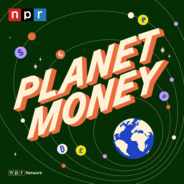When you sit down to watch the Oscars, what you are really watching is the final battle in a months-long war of financial engineering and campaign strategy. Because in Hollywood, every year is an election year. A small army of Oscars campaign strategists help studios and streamers deploy tens of millions of dollars to sway Academy voters. And the signs of these campaigns are everywhere — from the endless celebrity appearances on late night TV to the billboards along your daily commute. On today's show, we hit the Oscars campaign trail to learn how these campaigns got so big in the first place. And we look into why Hollywood is still spending so much chasing gold statues, when the old playbook for how to make money on them is being rewritten. This episode was hosted by Alexi Horowitz-Ghazi. It was produced by Emma Peaslee and edited by Jess Jiang. It was engineered by Cena Loffredo and fact checked by Sierra Juarez. Alex Goldmark is Planet Money's executive producer. Help support Planet Money and get bonus episodes by subscribing to Planet Money+ in Apple Podcasts or at plus.npr.org/planetmoney.Learn more about sponsor message choices: podcastchoices.com/adchoicesNPR Privacy Policy

Wirtschaft
Planet Money Folgen
Wanna see a trick? Give us any topic and we can tie it back to the economy. At Planet Money, we explore the forces that shape our lives and bring you along for the ride. Don't just understand the economy – understand the world.Wanna go deeper? Subscribe to Planet Money+ and get sponsor-free episodes of Planet Money, The Indicator, and Planet Money Summer School. Plus access to bonus content. It's a new way to support the show you love. Learn more at plus.npr.org/planetmoney
Folgen von Planet Money
354 Folgen
-
Folge vom 08.03.2024On the Oscars campaign trail
-
Folge vom 06.03.2024Is dynamic pricing coming to a supermarket near you?Dynamic pricing is an increasingly common phenomenon: You can see it when Uber prices surge during rainy weather, or when you're booking a flight at the last minute or buying tickets to your favorite superstar's concert. On an earnings call last week, Wendy's ignited a minor controversy by suggesting it would introduce dynamic pricing in its restaurants, but the company quickly clarified that it wasn't planning on using it for "surge pricing."One place you hardly ever see dynamic pricing? American supermarkets. Why is that? Why shouldn't the prices for meat or bread or produce go down as they get older? Why does all the milk in the store cost the same, even when the "sell by" dates are weeks apart? Wouldn't a little more flexibility around prices be better for customers and help reduce waste?Professors Robert Evan Sanders and Ioannis (Yannis) Stamatopoulus had similar questions. So they set out to discover what was keeping supermarkets from employing a more dynamic approach, and what might convince them it was time for a change ... in pricing.This episode was hosted by Amanda Aronczyk and Nick Fountain. It was produced by Willa Rubin and edited by Keith Romer. It was engineered by Valentina Rodríguez Sánchez and fact-checked by Sierra Juarez.Learn more about sponsor message choices: podcastchoices.com/adchoicesNPR Privacy Policy
-
Folge vom 01.03.2024Shopping for parental benefits around the worldIt is so expensive to have a kid in the United States. The U.S. is one of just a handful of countries worldwide with no federal paid parental leave; it offers functionally no public childcare (and private childcare is wildly expensive); and women can expect their pay to take a hit after becoming a parent. (Incidentally, men's wages tend to rise after becoming fathers.) But outside the U.S., many countries desperately want kids to be born inside their borders. One reason? Many countries are facing a looming problem in their population demographics: they have a ton of aging workers, fewer working-age people paying taxes, and not enough new babies being born to become future workers and taxpayers. And some countries are throwing money at the problem, offering parents generous benefits, even including straight-up cash for kids. So if the U.S. makes it very hard to have kids, but other countries are willing to pay you for having them....maybe you can see the opportunity here. Very economic, and very pregnant, host Mary Childs did. Which is why she went benefits shopping around the world. Between Sweden, Singapore, South Korea, Estonia, and Canada, who will offer her the best deal for her pregnancy?Help support Planet Money and get bonus episodes by subscribing to Planet Money+ in Apple Podcasts or at plus.npr.org/planetmoney.Learn more about sponsor message choices: podcastchoices.com/adchoicesNPR Privacy Policy
-
Folge vom 29.02.2024The secret world behind school fundraisersFundraising is a staple of the school experience in the U.S. There's an assembly showing off all the prizes kids can win by selling enough wrapping paper or chocolate to their neighbors. But it's pretty weird, right?Why do schools turn kids into little salespeople? And why do we let companies come in and dangle prizes in front of students?We spend a year with one elementary school, following their fundraising efforts, to see how much they raise, and what the money goes to. The school – Villacorta Elementary in La Puente, California – has one big goal: To raise enough money to send every single student on one field trip. The whole school hasn't been able to go on one in three years. We find out what the companies who run school fundraisers do to try to win a school's business. And we find that this bizarre tradition is ... surprisingly tactical. That's on today's episode. Today's show was hosted by Sarah Gonzalez and produced by Sam Yellowhorse Kesler. It was edited by Jess Jiang, fact checked by Sierra Juarez, and engineered by Valentina Rodríguez Sánchez. Alex Goldmark is Planet Money's executive producer. Help support Planet Money and get bonus episodes by subscribing to Planet Money+ in Apple Podcasts or at plus.npr.org/planetmoney.Learn more about sponsor message choices: podcastchoices.com/adchoicesNPR Privacy Policy
